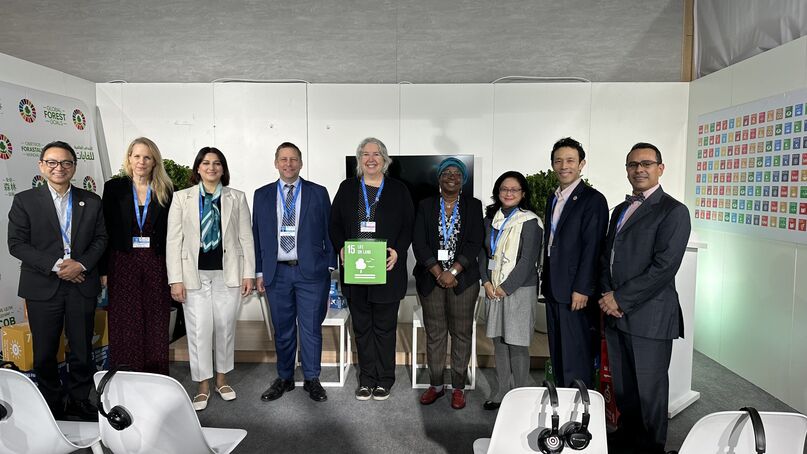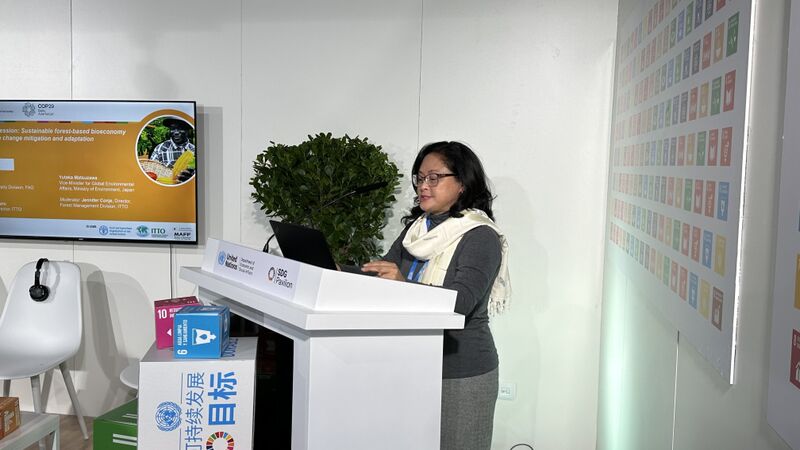Exploring sustainable forestry, financing, and bioeconomies
29 November 2024

ITTO partners at the Sustainable Forest-Based Bioeconomy for Climate Change Mitigation and Adaptation session at UNFCCC COP29.
Yokohama, Japan, 29 November 2024: As part of the broader discussions on climate financing at the 29th Conference of the Parties of the UN Climate Convention (COP 29), members of the Collaborative Partnership on Forests (CPF) advocated for increased financing in sustainable forestry to unleash its benefits in building bioeconomies that facilitate the transition to carbon neutral societies.
In partnership with the Food and Agriculture Organization of the United Nations (FAO) and Japan’s Ministry for Agriculture, Forestry and Fisheries (MAFF), the International Tropical Timber Organization (ITTO) hosted a dedicated day on “Sustainable forest-based bioeconomy for climate change mitigation and adaptation” on November 20, 2024. The event featured a morning of interactive sessions at the Forest Pavilion, followed by in-depth interviews in the afternoon.
ITTO Executive Director Sheam Satkuru, through a video message, highlighted the diverse benefits of sustainable forest management (SFM). She emphasized that beyond timber harvesting, SFM encompasses biodiversity conservation, landscape restoration, and livelihood support for forest-dependent communities. She elaborated on the concept of a circular bioeconomy, where sustainable supply chains connect global markets to forest ecosystems and local communities.
“Sustainable forest management is much more than sustainable timber harvesting. It creates a circular bioeconomy where markets—through sustainable use—become a driver for forest conservation,” — Sheam Satkuru, ITTO Executive Director.
Financing Forest Product Value Chains for Climate Action
A key session, led by ITTO, explored the theme of “Finance and investment in forest product value chains for climate action.” Panelists from the Green Climate Fund, Global Environmental Facility, Programme for the Endorsement of Forest Certification, and ITTO shared insights into their efforts to scale up investments in sustainable forestry. Discussions revolved around:
- The role of sound forest data and regulatory frameworks
- Forest certification as a tool for increasing market access
- Innovative financial mechanisms and niche market development
- Accelerating climate action through enhanced funding in forest product value chains
The audience posed questions on pressing issues such as the impacts of the European Union Deforestation Regulation on smallholders, global funding solutions for ecosystem services, and the need for climate finance to support research and development in forestry.

The Path to a Sustainable Bioeconomy
Other sessions during the event focused on topics such as the importance of forest data transparency in implementing the Paris Agreement and the transformative potential of sustainable wood in bioeconomies. Speakers emphasized the urgency of:
- Increasing investments in sustainable wood-based solutions
- Strengthening global partnerships and cooperation
- Improving visibility of the benefits of sustainable forestry to drive public and private sector engagement
Looking Ahead to COP 30
The event concluded with a powerful call to action from Ms Ana Euler, Executive Director of Business at EMBRAPA, urging stakeholders to maintain momentum in advocating for the multifunctional role of forests and bioeconomies. As COP30 approaches in 2025, the message was clear: forests are pivotal to climate action, and investing in sustainable forestry is key to unlocking their potential for a greener future.
Watch these recordings of the sessions at the first Forest Pavilion at the UNFCCC COP:
- Opening Session and Transparent forest data in support of the sustainable forest based bioeconomy
- Realizing the potential of the forest based bioeconomy through sustainable wood
- Finance and investment in forest product value chains for climate action
- Closing session Sustainable forest based bioeconomy for climate change mitigation and adaption